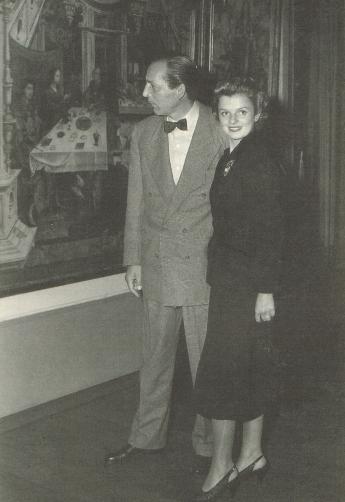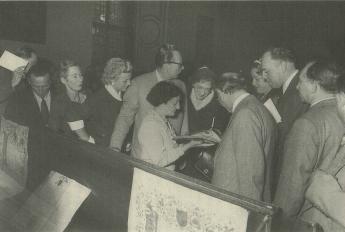Some Aspects of Milan - The ILAB Congress 1953

“The Milan conference saw the publication and distribution of A Compendium of Usages and Customs of the Trade (today: The ILAB Code of Ethics). This useful volume defined the customary practices of the rare book trade (as William Kundig had once proposed) for use in disputes, litigation, or legal difficulties … This being Italy, the venue for the farewell dinner could hardly have been more romantic. Coaches were hired to drive us all to Lake Como, where we dined in the ballroom of the Grand Hotel Villa de’Este, the honeymoon choice of many a British bride and bridegroom in pre-war days. After the dinner and not-to-be-avoided speeches, we danced until two in the morning on the cool mosaic floor, ending the evening with Ingelese Blaizot singing French love songs and Percy responding with English ones.” (Barbara Kaye Muir)
Impressions from “C.H.”, an Englishman in Milan:
Our journey started with a minor mishap. The aeroplane developed some trouble with the oil pressure and we had to touch down at Geneva, wait there for some hours before another plane was ready to proceed to Milan. We did not arrive until one in the morning and, after a bus ride into the city, it was 2.30 am before we were in bed.
I awoke about nine the next morning, pushed what I thought was the bell for the waiter, but I merely switched on the light. I found the right bell and a waiter appeared looking like the first murderer in Macbeth. “Coffee, please,” I murmured, and then proceeded to wake myself up with a shower. Refreshed, I went out to explore Milan.
Milan is just a reproduction of a Middle West American city. Great massive blocks of flats, factories and other uninteresting buildings. The cathedral, an ornate piece of architecture without the charm of many English cathedrals, the prison-like Castello Sporzesco, is all that reminds us of the historical past. Why, I wondered, was Milan chosen for the Conference when there are so many beautiful cities in Italy.
Milan has all the appearances of being “well to do”. The shops are filled with luxury goods, everyone is well dressed, the streets were crowded with new cars travelling at breakneck speed. But behind all the show of wealth there seemed to lurk an uneasy feeling, no one trusted the lira, so why not spend it? On Sunday morning we wandered about until tired with walking we sat down in front of one of the open air cafés in a huge glass-covered arcade by the Cathedral Square. This arcade, mainly made up of open air cafés, new bookshops and fancy shops, is a public promenade. It has two guardians dressed in comic opera uniforms of the era of Offenbach, cocked hats, tail coats, leggings and large cavalry swords. What duties these two persons performed no one seemed to know.
In the afternoon we attended the Reunion Inaugural in a large gloomy room in the Museo de la Technique which had once been a convent chapel. We split up into groups, each delegate taking refuge with his own compatriots. After dinner we met at the Scala, looking forward to the great occasion at the Mecca of the opera lover. But, unfortunately, it was a fiasco, and we were to witness one of the worst displays of ballet I had ever seen. I will not reveal the name of the company who give this boring show, but it was not Italian. The Opera house is a wonderful place, but how we longed for an opera. The attendants were all dressed in black and wore a long chain round their necks from which dangled a large medal. What this stood for I could not find out.
On Monday we had a long day of work and as time went on we looked at our watches as we had to be at a reception by the Mayor of Milan by 6.30 pm. When we did get away there were no conveyances, and we had to hunt for taxis. At last we found one, and six of the English delegation bundled in. But the taxi took us to the Town Hall instead of the Mayor’s residence, and when we finally reached our destination we found that the reception was nearly over. We had some refreshment and arrived home tired out.
Tuesday morning, we met at the Sforza Castle, a rather gloomy fortress built in the Middle Ages, which is filled with art treasurers. These, unfortunately, we could not see. A reception followed in the courtyard and after which we inspected some fine illuminated manuscripts. Afterwards some of the English party found a restaurant and regaled themselves with steaks cooked in butter “in front of your very eyes,” as Arthur Askey would say. In the afternoon there was the Conference. At 9 o’clock in the evening we visited the fine collection of works of art at the Brera Galleries. When we came out it was pouring with rain and there were no taxis, and we had to get home as best we could.
Wednesday was taken up entirely with the business of the Conference.
Thursday was free, but in the evening there was the Farewell Dinner at the Grand Hotel Villa d’Este Como. We were driven to Como in motor coaches, an hour’s journey from Milan, and it was very dark when we arrived. Some of us regretted that the journey had not been planned a little earlier to enable us to have seen the beauties of Lake Como. As is customary at all League functions, the dinner ended with each president making a speech of thanks to their hosts and of well wishes for the League. The evening ended with dancing and at 12 pm, I left Como and returned to Milan. I left early as I had to make an early start for Florence in the morning.
The journey to Florence was made in the “Super Rapide”, one of the finest trains in the world. It speeds over 90 miles an hour and just glides along. The coaches are all saloons, there is a dining, bar and observation coach at the end, and it arrived dead on time. Most of the railway stations in Italy were destroyed by the Germans and these have been rebuilt so that the gloom which haunts most railway stations was absent. I was pleased to find that my hotel in Florence was old-fashioned. No chromium, no bell boys, nor any of the other ultra modern importations from American hotels. The head waiter studied our gastronomical desires, while the head porter was our guide and mentor and both could speak English. My first walk was along the banks of the Arno and there is in my mind’s eye was the background of Walker’s picture of the meeting of Dante and Beatrice. I had only three days in Florence and could only skim over its many beauties. After a long but not uncomfortable railway journey we reached Venice. I had been thinking during the journey, would Venice come up to expectations? Was the enthusiasm of Ruskin and the writers through the centuries misplaced? You leave the railway station and instead of a taxi you take a gondola. Every gondola is the same as another, both craft and fittings are traditional and the skill of the timoneer superb. Slowly you skim over the water, which is muddy but not, according to popular repute, smelly: they are tidal and so are always changed. There is no end to what could be written of Venice, its clean narrow streets where there is no wheel traffic of any kind, its thousand of shops (it is a city of shops), its picturesque and beautiful buildings and a thousand and one other things. One could go on and talk about this unique city, and when one comes away ou have only one thought – to re-visit it.
On my way home from Italy I thought why could not the Conference have been held in Venice? What an opportunity had been missed. Next year it will be held in Vienna, and knowing the traditional good nature of the Austrians it is something to look forward to. And Vienna? Is it the same Vienna? The gay hearted city of our dreams, the city of Strauss? After two wars we do not know, but we are sure the Austrians themselves have not changed.
Extract from ABA Newsletter 21, March 1954. (The pictures show delegates of the 1953 ILAB Congress and former ILAB President Georges Blaizot with his wife Ingelese Blaizot)

